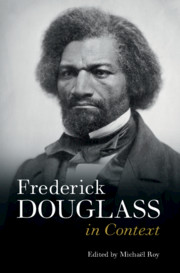Book contents
- Frederick Douglass in Context
- Frederick Douglass in Context
- Copyright page
- Contents
- Illustrations
- Contributors
- Chronology
- Abbreviations
- Introduction
- Part I Places
- Part II Genres
- Part III Activism
- Chapter 12 Abolition
- Chapter 13 Temperance
- Chapter 14 Women’s Rights
- Chapter 15 The Civil War
- Chapter 16 Reconstruction and Civil Rights
- Part IV Philosophy
- Part V Networks
- Part VI Afterlives
- Further Reading
- Index
Chapter 13 - Temperance
from Part III - Activism
Published online by Cambridge University Press: 16 June 2021
- Frederick Douglass in Context
- Frederick Douglass in Context
- Copyright page
- Contents
- Illustrations
- Contributors
- Chronology
- Abbreviations
- Introduction
- Part I Places
- Part II Genres
- Part III Activism
- Chapter 12 Abolition
- Chapter 13 Temperance
- Chapter 14 Women’s Rights
- Chapter 15 The Civil War
- Chapter 16 Reconstruction and Civil Rights
- Part IV Philosophy
- Part V Networks
- Part VI Afterlives
- Further Reading
- Index
Summary
Frederick Douglass’s perspective on temperance had much in common with the arguments articulated by northern free black conduct writers, reformers and institution builders. Like many of them, Douglass believed that the rhetoric and daily practice of temperance served the larger fight against slavery and racism by contributing to the forms of black self-mastery, independence, and self-determination most feared by proponents of slavery in the United States. Alcohol consumption, meanwhile, cultivated exactly the kind of dependence preferred by slaveholders. Emphasizing its revolutionary potential for African Americans, Douglass characterized temperance as essential for the black freedom struggle throughout his career, continuing to make his case for temperance even in the last decades of the nineteenth century when African Americans faced the specter of the rise of Jim Crow and the encroachment of new forms of oppression and servitude.
Keywords
- Type
- Chapter
- Information
- Frederick Douglass in Context , pp. 162 - 171Publisher: Cambridge University PressPrint publication year: 2021

